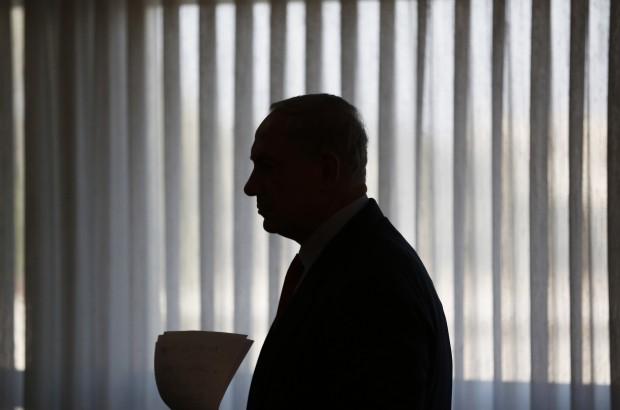Israel Prime Minister Public Wants Public to Vote on any Peace Deal
Israeli Prime Minister Benjamin Netanyahu is silhouetted as he arrives to deliver a statement to the media at the Knesset, Israeli parliament, in Jerusalem July 22, 2013. Netanyahu will seek formal cabinet backing for reviving U.S.-sponsored peace talks with the Palestinians, an Israeli official said, after pro-settler ministers threatened to try and thwart the initiative. REUTERS/Baz Ratner (JERUSALEM – Tags: POLITICS) – RTX11V4Y
It appears likely that the Israelis and the Palestinians are finally going to talk peace again after five years. US Secretary of State John Kerry raised those expectations in an announcement last week. Then Israeli and Palestinian leaders rushed to lower expectations.
Palestinian officials say they’re just talking about talks with no promise they’ll actually enter negotiations. And many Israeli officials are saying the best anyone can expect is a temporary peace agreement. But before these talks have even begun, a debate has erupted in Israel over the endgame.
If negotiators strike a peace deal, should the Israeli public get to vote yes or no?
It may sound like putting the cart before the horse, debating the final steps of a peace deal before Israelis and Palestinians have even set down together. But that’s what the Israeli prime minister is taking about right now.
Benjamin Netanyahu told his cabinet this week that if Israeli and Palestinian negotiator teams manage to reach a peace proposal that they’re both happy with, he would take it to the public for a countrywide vote. Decisions like this can’t be made by a governing coalition, he said; this thing must be put to a national referendum.
So who’s afraid of a referendum?
Two senior lawmakers from completely opposite sides of the political aisle, that’s who.
Both fear their sides would lose in a public vote.
Former foreign minister, Avigdor Lieberman, is hardliner who thinks peace with the Palestinians right now makes no sense. But in a radio interview, he said if the government put a peace deal before the public, the public would most certainly vote yes – swayed by the media and “bear hugs” that Israelis would receive from the entire world.
But chief Israeli peace negotiator, Tsipi Livni, who favors a peace deal, actually fears Israelis might be pressured to vote no. Livni told Army Radio this week to try and imagine the stress Israelis would be under having to vote in favor or against a peace deal.
Many families have relatives living in settlements that Israel would evacuate under a peace deal. And how can you expect people to kick their own relatives out of their homes?
Livni says there’s a sense that politicians advocating a referendum are only looking to cover their you-know-whats.
Gil Hoffman, chief political correspondent of the conservative-leaning Jerusalem Post, says that theory makes sense.
“Politicians would feel lot less guilty,” he says. “They are not the ones responsible for evacuating 80,000 Jews from their homes. It will be collective responsibility of the public.”
Still, he says it’s only fair to ask people to determine their own fate.
“Europe has referendums all the time,” Hoffman says. “When they decided to join the European union, each country had a referendum. And for Israel’s future, this is just as serious a question as that.”
But there’s a politics to popping the question, says pollster Tamar Hermann. She surveys the Israeli public monthly on matters of war and peace for the liberal leaning Israel Democracy Institute.
Hermann says two thirds of Jewish Israelis support creating a Palestinian state alongside Israel. But she believes the opponents of such a move are more likely to show up at the ballot box.
“Because those on the negative side will have much to lose,” says Herman. “Those on the positive side, they would have stronger hesitations because they go for the unknown, actually, right?”
Right, or wrong, who knows? There’s never been a referendum of any kind in Israel.
It’s uncharted territory.
A vote on a referendum law could come early next week. And what about the Palestinians? President Mahmoud Abbas was recently quoted as saying that any peace deal would have to pass a Palestinian national referendum, too.
